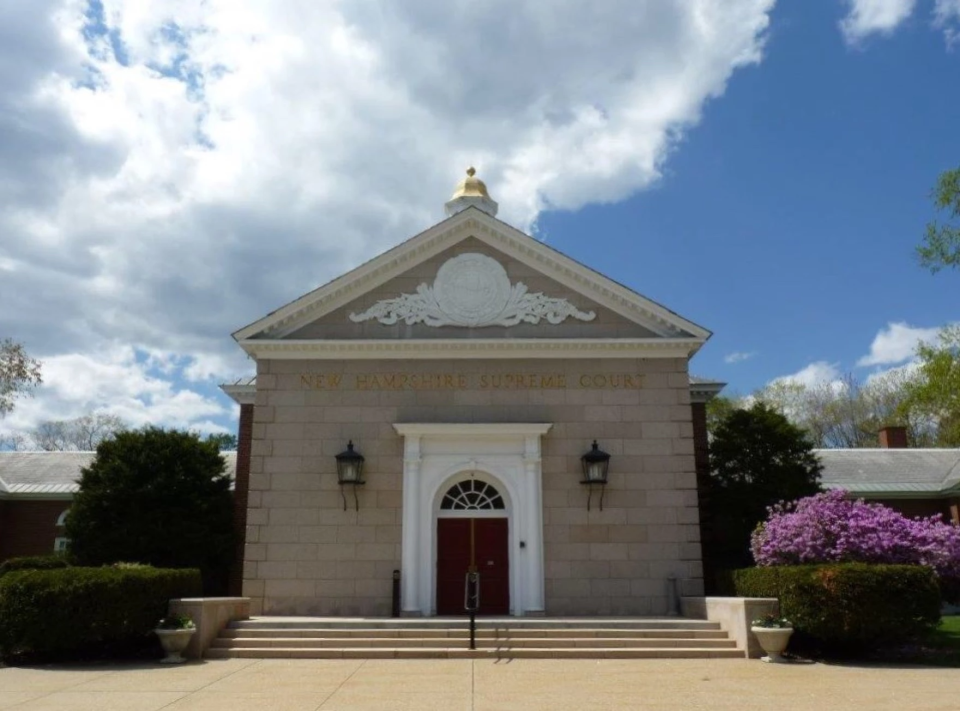‘Deepfake’ computer images can constitute harassment, NH Supreme Court agrees
The harassment started after the two graduated high school. And the methods were alarmingly modern.
The offender would post comments expressing fantasies that the victim would be raped or shot, according to court documents. He uploaded a profile of her onto an online dating app, using her own profile picture. And he used software to create computer-generated images of her, posting fake images of her naked, being choked by a police officer, and stabbed.

The victim eventually obtained a stalking protective order, blocking the perpetrator not only from direct contact but also from mentioning the victim’s name in any post online and posting any image of her, real or computer-generated. The perpetrator objected, arguing the digital images were a form of expression protected by free speech.
This month, the New Hampshire Supreme Court upheld that order, blocking an attempt by the defendant to throw out the restrictions for going too far.
Now, advocates hope that decision, S.D. vs. N.B., will help deter offenders from using artificial intelligence and “deepfakes” to torment their victims online. And they say it sends victims in New Hampshire a strong message that they can go to the courts to stop that behavior.
“The court’s decision will be incredibly impactful because they affirmed that safety is a compelling public interest,” said Lyn Schollett, executive director of the New Hampshire Coalition Against Sexual and Domestic Violence.
“While most speech is protected, not all speech is protected,” Schollett added. “One form of speech that is not protected is true threats.”
The coalition is planning to use the latest precedent to spread awareness of the protection options available to victims when it comes to online offenses, Schollett said.
In S.D. vs. N.B., a trial court found that the defendant’s behavior, including the posts using computer-generated images of sexual and physical violence, constituted a threat.
The defendant countered that any restraining order should stop him only from contacting the victim; he argued that anything he posted online about the victim is protected by the state constitution’s right to free speech.
Siding with a superior court ruling, the Supreme Court rejected that argument. Even though speech has some of the highest protections in law, the interests of the victim outweighed those protections in this case, the court held.
Mary Krueger, a staff attorney at New Hampshire Legal Assistance, said the decision added important clarifications to free speech.
“(The court) said, given the circumstances of this particular case, the interest is to protect victims of stalking from further stalking behavior,” Krueger said.
Stalking and harassing is not new, but digital tools have allowed offenders to more easily do it at home. That can lead offenders to feel that it is easier to get away with, and allows them to escape some of the social consequences of doing it in person, Krueger and Schollett said.
“They can do it from their living room,” Krueger said of online harassment. “They don’t have to do anything.”
That is why the ruling is important, she added. While online harassment was always a form of stalking prohibited by state law, the Supreme Court has now made that clear – and sent a message to perpetrators that there will be consequences if they go too far.
“If anything, it gives more of a directive to the defendant that this can’t continue,” she said. “This would be a violation of the (protective) order.”
The state Supreme Court has already ruled that threatening or harassing social media posts about a person can still count as stalking, even if the offender never sent them directly to the victim. That case, State v. Craig, was decided in 2015; this year’s decision defines the boundaries further, Krueger said.
To Schollett, the ruling will provide welcome clarity in the battle against online harassment. About 80 percent of stalking victims are pursued online, she said. “Most offenders use multiple meanings or modes of terrorizing the victims they identify,” she said.
That can take many forms, from perpetrators posting untrue things about their victims, to making comments about their children or pets, to posting images of them – real or computer generated.
And the online behavior can be devastating, Schollett said.
“When we talk to victims about what they experience when they are stalked, the consequences are very similar whether the stalking happens online or in person,” she said. “There’s well-documented research that victims not surprisingly suffer psychological consequences – fear, hypervigilance, constant awareness, the sensation of always being watched – but also physical illnesses, chronic illnesses, and social impacts, because they often feel compelled to withdraw from society.”
In this month’s case before the court, the victim lived in the same community and shared mutual acquaintances with the offender; his online behavior, whether directed to her or not, had real-world effects because her friends would tell her about it, Schollett said.
“Certainly, that is the important message from the Supreme Court’s opinion which is that you cannot terrorize someone online, and call it protected speech,” she said. “And so we absolutely will work with the crisis centers to make sure that victims know that this is not protected conduct, and that they can apply for protection from this kind of harassment and abuse.”
Resources
If you or someone you know has been affected by domestic violence or stalking, call New Hampshire’s 24/7 hotline at 1-866-644-3574.
This article originally appeared on Portsmouth Herald: ‘Deepfake’ images can constitute harassment: NH Supreme Court

